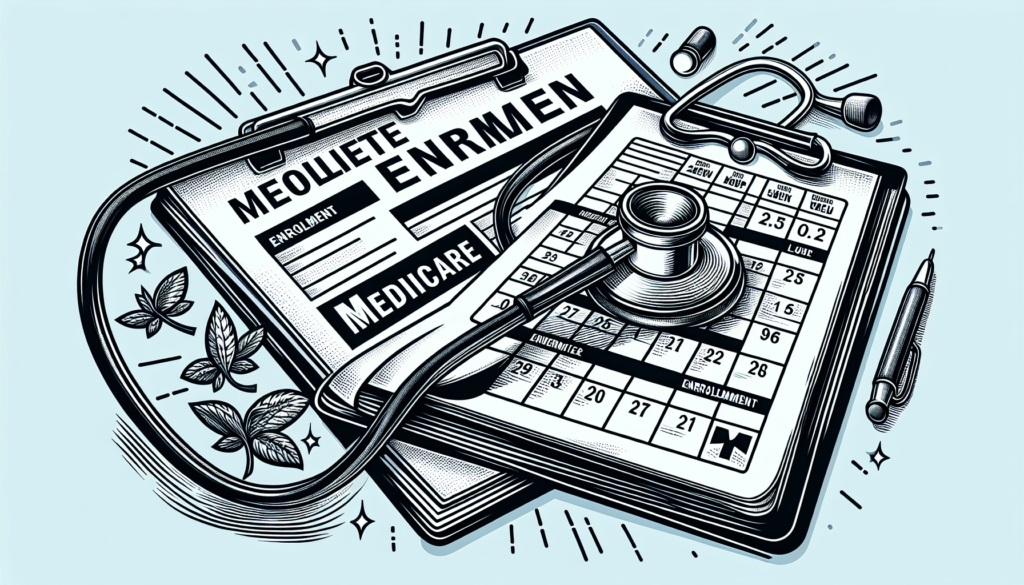If you’re approaching or have already hit the age of 65 in the United States, you may be wondering about the ins and outs of enrolling in Medicare. Fortunately, you’re not alone in asking these important questions. Medicare is a federal health insurance program that caters to the healthcare needs of individuals aged 65 and older, as well as certain younger individuals with disabilities or specific medical conditions. In this article, we’ll address your queries about how to enroll in Medicare and shed light on the best time to do so. We’ll explore various aspects of the program, from eligibility and enrollment to coverage options, costs, and any upcoming changes or updates that may affect you. So, let’s navigate the world of Medicare together and ensure you have the information you need to make informed decisions about your healthcare coverage.

Overview of Medicare Enrollment
Introduction to Medicare enrollment
Enrolling in Medicare is an important step in obtaining healthcare coverage, especially for individuals who are 65 or older, or those with disabilities or specific medical conditions. Medicare provides vital healthcare benefits to millions of Americans, making it crucial to understand the enrollment process.
Who is eligible for Medicare
Medicare is primarily available to residents of the United States who are 65 or older. However, certain younger individuals with disabilities or specific medical conditions may also be eligible. Knowing your eligibility status is essential before proceeding with enrollment.
Different parts of Medicare
Medicare is composed of different parts, each covering specific aspects of healthcare. Part A provides hospital insurance, while Part B offers medical insurance. Part C, also known as Medicare Advantage, combines Parts A and B, and often includes additional benefits. Finally, Part D provides prescription drug coverage.
Importance of enrolling in Medicare
Enrolling in Medicare is crucial to ensure you have access to affordable healthcare coverage. It protects you against unforeseen medical expenses, provides coverage for essential services, prescription drugs, and preventive care. Timely enrollment is necessary to avoid potential penalties and delays in accessing the benefits you need.
Initial Enrollment Period
Explanation of the Initial Enrollment Period (IEP)
The Initial Enrollment Period (IEP) is the first opportunity for individuals to enroll in Medicare. It typically begins three months before the month of your 65th birthday and extends for three months after. For example, if your birthday is in June, your IEP starts on March 1st and ends on September 30th.
When the IEP occurs
Your specific IEP will depend on your birthday month. It’s important to mark your calendar and plan ahead to ensure you don’t miss this enrollment window.
Consequences of missing the IEP
Failing to enroll during your Initial Enrollment Period can result in late enrollment penalties, potentially leading to higher premiums for Part B and Part D coverage. Additionally, procrastinating enrollment might cause gaps in your healthcare coverage.
Steps to enroll during the IEP
Enrolling during your Initial Enrollment Period is a straightforward process. Visit the official Medicare website or contact their helpline to gather the necessary information and complete your enrollment. Online enrollment is also available for added convenience.
General Enrollment Period
Explanation of the General Enrollment Period (GEP)
The General Enrollment Period (GEP) is an opportunity for those who missed their Initial Enrollment Period to still enroll in Medicare. Unlike the IEP, the GEP occurs annually and runs from January 1st to March 31st.
When the GEP occurs
If you missed your Initial Enrollment Period, mark your calendar for the General Enrollment Period. This is your chance to enroll in Medicare and avoid further penalties or delays.
How to enroll during the GEP
During the General Enrollment Period, you can complete your Medicare enrollment by visiting the official website, calling the helpline, or utilizing the online enrollment option. Make sure to gather all necessary documents and information beforehand to streamline the process.
Coverage start date for GEP enrollees
If you enroll during the General Enrollment Period, your coverage will typically start on July 1st of the same year. It’s important to plan accordingly to prevent any gaps in your healthcare coverage.
Special Enrollment Periods
Who qualifies for Special Enrollment Periods (SEP)
Certain individuals may qualify for Special Enrollment Periods (SEPs) outside of the Initial and General Enrollment Periods. These SEPs allow for enrollment in Medicare due to specific life events or circumstances.
Examples of qualifying life events
Qualifying life events for a Special Enrollment Period may include retirement, loss of employer coverage, relocation, marriage, or divorce. These events trigger a SEP, providing you with additional opportunities to enroll in Medicare.
How to enroll during an SEP
If you experience a qualifying life event, you can enroll in Medicare during the associated Special Enrollment Period. Contact the Medicare helpline or visit their website to navigate the enrollment process effectively.
Deadline for SEP enrollment
The deadline for enrolling during a Special Enrollment Period varies depending on the nature of the qualifying event. It’s crucial to understand the specific timeline and ensure timely enrollment to avoid penalties or gaps in coverage.

Medicare Advantage Open Enrollment Period
Explanation of the Medicare Advantage Open Enrollment Period
The Medicare Advantage Open Enrollment Period (MA OEP) allows individuals already enrolled in a Medicare Advantage plan to make changes to their coverage. This period serves as an opportunity to reassess your needs and adjust your plan accordingly.
When the Open Enrollment Period occurs
The Medicare Advantage Open Enrollment Period occurs from January 1st to March 31st each year. It provides individuals with an existing Medicare Advantage plan a chance to switch to another plan or return to Original Medicare.
Changes allowed during the Open Enrollment Period
During the Open Enrollment Period, you can make several changes to your Medicare Advantage plan. These changes may include switching to a different Medicare Advantage plan, adding or dropping prescription drug coverage, or returning to Original Medicare with or without a Part D plan.
Enrollment process for Medicare Advantage plans
To make changes to your Medicare Advantage plan during the Open Enrollment Period, contact your plan provider or visit their website. They will guide you through the necessary steps to review, compare, and adjust your coverage based on your needs.
Medigap Open Enrollment Period
Explanation of the Medigap Open Enrollment Period
The Medigap Open Enrollment Period is a critical opportunity for individuals with Original Medicare to enroll in a Medigap plan. Medigap, also known as Medicare Supplement Insurance, provides additional coverage to complement the gaps in Original Medicare.
When the Medigap Open Enrollment Period occurs
The Medigap Open Enrollment Period starts when you turn 65 and are enrolled in Medicare Part B. It lasts for six months, during which you have a guaranteed right to purchase any Medigap plan available in your area.
Importance of enrolling during the Medigap Open Enrollment Period
Enrolling in a Medigap plan during the Open Enrollment Period is essential to secure the coverage you need without facing medical underwriting. After this period, insurers may utilize medical underwriting and charge higher premiums or even deny coverage based on pre-existing conditions.
Enrollment process for Medigap plans
Research and compare available Medigap plans in your area to determine the best fit for your healthcare needs. Contact insurance providers offering Medigap coverage and complete the enrollment process either online or by phone.
Special Considerations for Working Individuals
Effect of employer coverage on Medicare enrollment
Working individuals who have employer-sponsored health coverage may wonder if they need to enroll in Medicare. The answer depends on the size of their employer and the type of coverage offered.
Options for delaying Medicare enrollment
If you have employer coverage and wish to delay enrolling in Medicare, you can generally do so without facing penalties. However, it’s essential to understand the rules and deadlines associated with delaying enrollment to make informed decisions.
Important factors to consider for working individuals
Working individuals should consider factors such as the size of their employer, employer health plan benefits, costs, and potential penalties before deciding whether to enroll in Medicare while still employed.
Penalties for late enrollment
Late enrollment in Medicare can result in lifelong premium penalties, particularly for Part B and Part D coverage. Understanding the consequences of late enrollment is crucial to making informed decisions regarding your healthcare coverage.
Resources for Assistance
Medicare website resources
The official Medicare website is a comprehensive resource offering information on eligibility, enrollment, coverage options, costs, and updates. It provides guidance and step-by-step instructions to assist individuals in navigating the Medicare enrollment process.
Local assistance options
In addition to online resources, there are local assistance options available to help individuals with Medicare enrollment. These may include State Health Insurance Assistance Programs (SHIP) or community organizations offering personalized guidance and support.
Contact information for Medicare help
For direct assistance, individuals can contact Medicare’s helpline at 1-800-MEDICARE (1-800-633-4227). Trained representatives are available to answer questions, provide guidance, and assist with enrollment-related concerns.
Guides and tutorials for enrollment
Medicare also offers helpful guides, tutorials, and videos to aid individuals in understanding the enrollment process. These resources provide valuable information and step-by-step instructions to ensure a seamless enrollment experience.
Upcoming Changes and Updates
Potential changes to Medicare enrollment rules
It’s important to stay informed about potential changes to Medicare enrollment rules. Legislative and regulatory updates may impact eligibility criteria, enrollment periods, coverage options, and associated costs.
Upcoming deadlines or enrollment periods
Being aware of upcoming deadlines and open enrollment periods is crucial for timely enrollment in Medicare. Stay updated on any changes or extensions to enrollment periods to maximize your access to healthcare coverage.
New coverage options and benefits
Medicare periodically introduces new coverage options and benefits. Keep an eye out for updates on plans, services, prescription drug formularies, and additional benefits that may enhance your healthcare coverage.
Recent updates from Medicare
Medicare frequently releases updates regarding eligibility guidelines, enrollment procedures, and coverage policies. Staying informed about recent updates ensures you have the most accurate information and can make educated decisions regarding your healthcare.
Conclusion
Recap of Medicare enrollment options
Enrolling in Medicare is a vital step in accessing affordable healthcare coverage. Understanding the different enrollment periods, such as the Initial Enrollment Period and General Enrollment Period, as well as Special Enrollment Periods for qualifying life events, ensures you have options to secure coverage based on your specific needs.
Importance of timely enrollment in Medicare
Timely enrollment in Medicare is crucial to avoid penalties, gaps in coverage, and delays in accessing necessary healthcare services. It provides peace of mind, protection against unexpected medical expenses, and access to essential benefits.
Final thoughts and recommendations
Navigating Medicare enrollment can be overwhelming, but assistance is readily available. Take advantage of the resources provided by Medicare’s official website, local assistance options, and customer service helpline to obtain personalized guidance and support throughout the enrollment process.
Encouragement to seek personalized guidance
Every individual’s healthcare needs are unique. Consider seeking personalized guidance from a trusted healthcare advisor, insurance professional, or Medicare expert to ensure you make informed decisions and select the coverage options that best meet your specific requirements.



